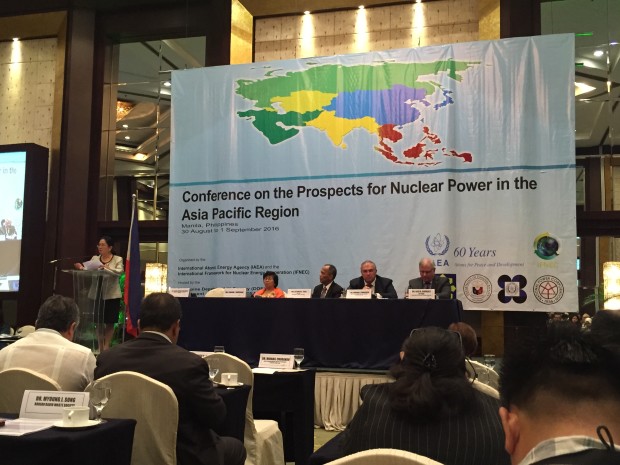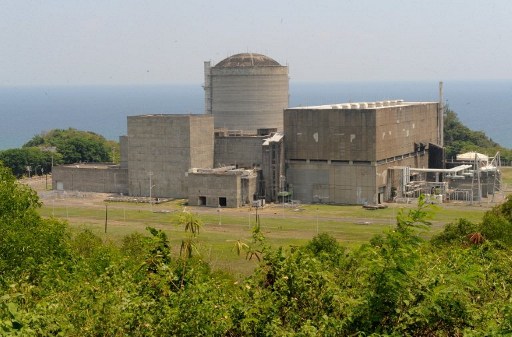PH gov’t gets crash course on nuclear energy
A CRASH course on “Nuclear 101.”
That was how Energy Secretary Alfonso Cusi described the three-day international conference on the prospects of nuclear power in the Asia Pacific Region that culminated on Thursday.
Cusi said that people often ask him about his stand on nuclear power plants and that the conference gave him “a virtual crash course on the entire chain of launching a nuclear program and the importance of public information.”
That same morning, the secretary visited the mothballed Bataan Nuclear Power Plant (BNPP) amid increasing talk on the possibility of reviving it to address the country’s energy needs.
“The timing of this summit is perfect. As a coincidence we had a hearing also in the Senate. We discussed also nuclear power plants and today we inspected the BNPP and there are a lot of discussions,” he said.
Cusi said one of the things they learned was how other nations launched their own nuclear programs.
“All your inputs will help us in revisiting the direction we will take for nuclear,” he said.
Cusi said this as environmental groups and the Church expressed opposition to any plan to use nuclear power plants, which they say pose a large risk to the people in the event of a nuclear meltdown.
Public acceptance
Ambassador Zeneida Angara Collinson, who chaired the conference, said she thinks the biggest takeaway for the Philippines was its need to formulate a nuclear energy policy.
Collinson, who is the country’s ambassador and permanent representative to the United Nations and other international organizations in Vienna, said it was also important that the Department of Energy and the local media were invited to the conference.
“For me the most important is the understanding of our people about what nuclear energy, nuclear power is all about. Having understood that, then we can form our own opinion,” she said.
Talking to reporters, she agreed that public acceptance is important.

The International Atomic Energy Agency holds the Conference on the Prospects for Nuclear Power in the Asia Pacific Region at the Diamond Hotel in Manila from August 30 to September 1, 2016. Photo by Kristine Angeli Sabillo/INQUIRER.net
The 630-megawatt BNPP constructed during the Marcos administration was ready to be operated until the next administration decided not to push through with it because of safety concerns.
Among the incidents that affected its mothballing were the 1979 Three Mile Island accident in the United States, which resulted in the evacuation of nearby communities, and the 1986 Chernobyl disaster in Ukraine, which directly resulted in the deaths of more than 30 people due to the effects of radiation.
However, Collinson pointed out that experts who attended the event claimed that the BNPP was “sturdier” than the nuclear reactor in Fukushima, which was damaged by an earthquake and a tsunami.
“So we can have an earthquake and a tsunami both and our Bataan power plant could withstand the force. I’m not the expert but these are the experts who are telling us,” she said.
“There are around 450 nuclear reactors in the world today operating safely,” she also said.
Cost analysts
Like Cusi, Collinson said experts will still need to do a cost analysis to see if it is worth it to revive the BNPP, which is already 30 years old. She said a power plant can last up to 80 years.
She said that while a single nuclear reactor will cost billions of pesos, it is cheaper to run because of the relatively cheap cost of fuel.
In an earlier interview, Cusi said nuclear power is cheap and reliable, unlike oil that has fluctuating prices. He said nuclear power can also serve as a base load power source, unlike renewable energy sources like solar and wind.
Collinson said many of the future nuclear power plants will be set up in Asia, which has a very high growth rate.
“They (the countries) can no longer get it from biomass, solar. Ang solar wind, mga renewables they are fluctuating and we cannot use them as baseload,” she said.
The ambassador said the Philippines is already lagging behind. “Malaysia already has a nuclear science university,” she said, explaining that knowledge in nuclear science can be applied to agriculture and health.
As for the nuclear waste, she said various technologies are being explored. Finland, for example, is “looking at deep geological disposal.”
Clean energy
In her speech summarizing the conference, Collinson said the Asia Pacific region will benefit from the introduction of nuclear power “to decrease reliance of fossil fuels and meet clean energy objectives.”
This is important for the region, she said, since China and India are seen to cause half of future global carbon emissions.
“Nuclear power could be the largest individual contributor to emissions reductions in the electricity sector,” she said.
Requirements
Among the considerations in setting up nuclear reactors in a country are infrastructure and government commitment.
“Developing legal and regulatory framework — and the associated competencies — requires a considerable amount of effort,” she said.
Financing and waste management are also key issues, she said.
“Public participation and involvement is critical at every stage of a nuclear power program,” Collinson said, adding that non-government organisations and youth groups should be tapped.
She said the conference is only the first of many international gatherings as “nuclear energy will certainly dominate discussions in the future.”















